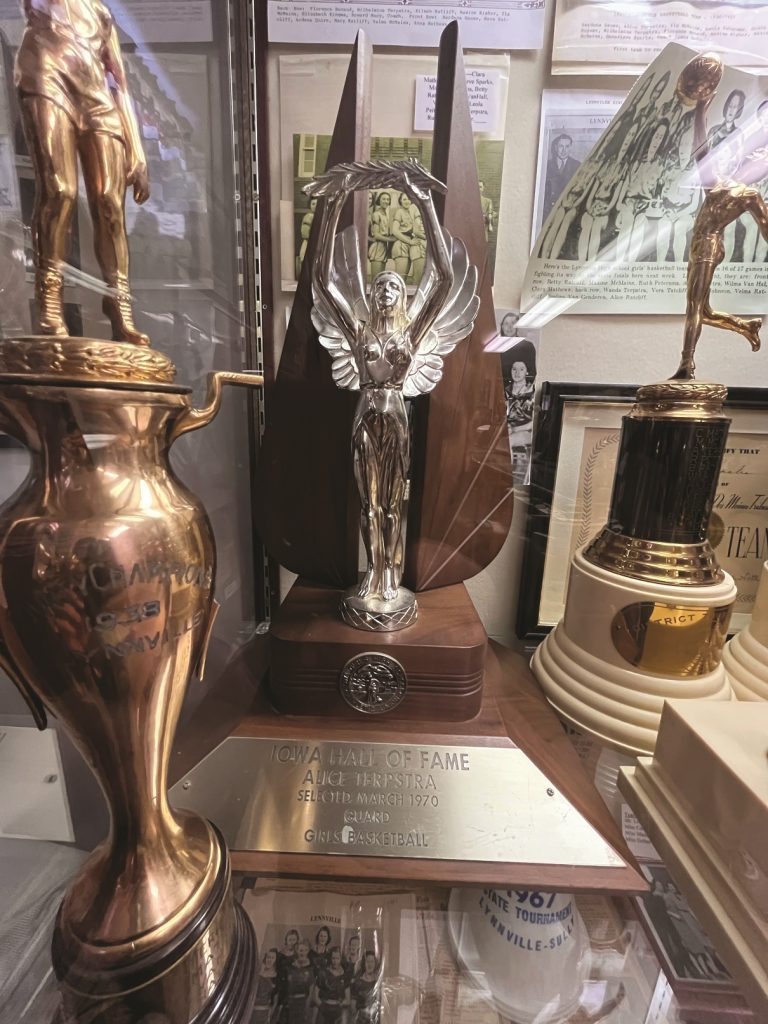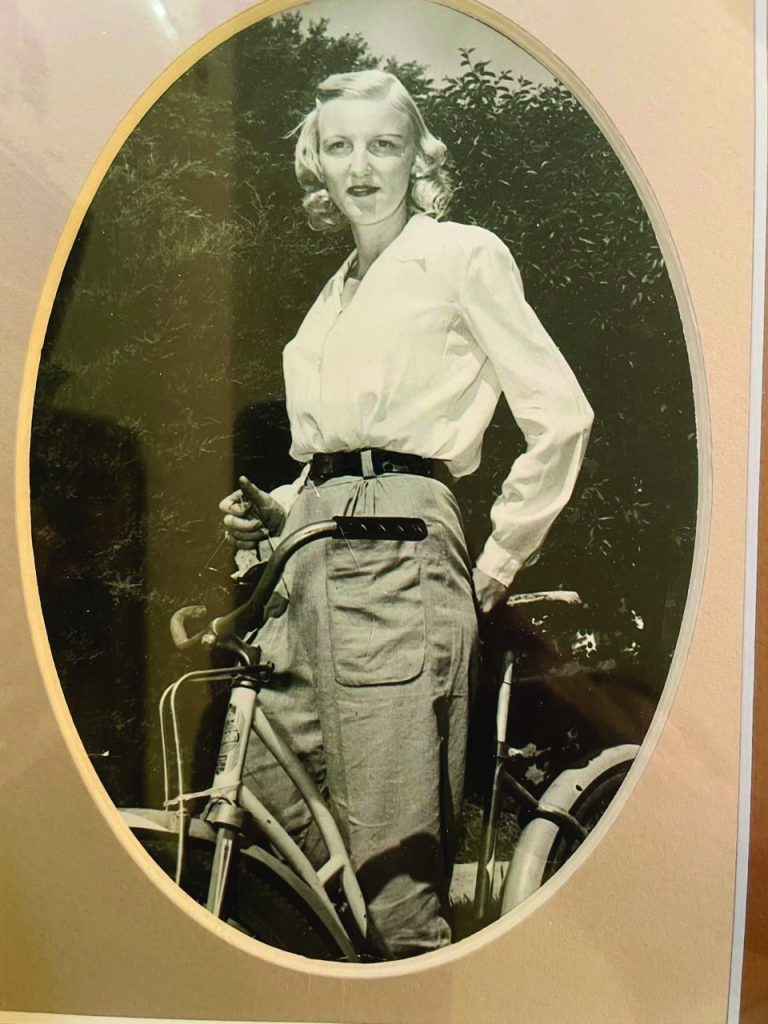Lynnville native Alice (Terpstra) LaRosa celebrates 100th birthday
Looking back on her 100 years of life, Alice (Terpstra) LaRosa said she has lived a charmed life. The former Lynnville resident considers herself lucky as she recalls the life she has lived and for reaching the milestone of becoming a centenarian on Mar. 28, 2023.
Alice grew up in and around Lynnville and remained in the area until she married in 1950. After that, she lived in and around the St. Louis, MO, area. And now, impressively, she lives on her own in an apartment located in Andover, KS.
Even though some memories are a little fuzzy to Alice, she did a pretty impressive job piecing together the details of her past as she shared more about her roots and life story.
FAMILY HISTORY
Alice’s mother, Wietske Rena Visser, immigrated to the U.S. in 1911 from the Netherlands, where she had lived on a boat on a canal. Sadly, Wietske became a widow with three small children when her first husband passed away. Another tragedy struck when her two-year-old son died of the Spanish Flu.
Alice’s father, Arie Terpstra, was also an immigrant from the Netherlands, coming to the U.S. in 1908. He also experienced heartache as a young adult when his wife of five years passed away, leaving him with a son, George.
Wietske ended up marrying Arie in 1921, and they went on to have four children together, starting with Alice in 1923.
In addition to her half-sisters Elizabeth Van Rees and Alma Terpstra and half-brother George Terpstra, Alice had three brothers: Albert, Arnold, and John.
“I have tried to remember my earliest memory in life. I cannot come up with anything before my baby brother was born. That was Albert. He is four years and a month younger than me. I remember when my father said, ‘We are going to name the baby Albert Henry.’”
Albert was named in memory of the baby Alice’s mother lost. Albert went on to be a long-time Lynnville resident, and he now lives in an assisted living home in Grinnell. He is Alice’s only remaining sibling.
THE EARLY YEARS
Growing up, Alice lived on a farm a little over two miles northeast of Lynnville and attended Black Oak Country School. She has good memories from her childhood. “We may not have had anything compared to what children have today, but I didn’t know another world,” she said.
For the first 13 years of her life, Alice said she walked everywhere, whether it was the two-plus miles to Lynnville or the nearly two miles to their country school.
To keep their shoes clean while walking on the mud road their farm was located on, Alice recalled wearing four-buckle overshoes, which were essentially boots that went over top of their shoes.
Unlike quite a few families during that time, Alice’s family did have an automobile. However, they couldn’t really drive the car on their mud road, so it was usually kept on a gravel road in Lynnville. That way her dad could walk to the car and then tend to his business.
When she thinks about other memories from her childhood, Alice remembers eating a lot of cornmeal mush with blackstrap molasses. Though she didn’t enjoy it one bit, she does wonder if it helped her live to be 100.
“I had to eat that in the evening meal before I could have an egg,” Alice said. “I didn’t get the main meal until I ate my cornmeal mush with blackstrap molasses.”
Alice remembers the terrible drought that occurred in 1934, when she was 11 years old. She remembers the lack of food. As a family, they never wasted food, and to this day, she does not waste food.
Fond memories from Alice’s childhood include roller skating with skates that clamped to her regular shoes and reading the “Des Moines Tribune” newspaper. (Alice still receives a daily newspaper.)
“We were the only family at Black Oak School that took a Des Moines paper,” she said, “and I could take it to school and be the most popular student there because I had ‘Popeye.’ I remember the kids lining up because ‘Popeye’ was extremely popular.”
BECOMING A TOWN GIRL AND BASKETBALL PLAYER
In 1935, when Alice was 13 and in the seventh grade, she and her family moved to Lynnville. They lived by the Wagaman Mill – close enough that Alice could have her bedroom window open and hear the water running over the dam. It’s why, to this day, she has “much affection” for the people who have maintained the mill.
“I guess I was a river rat – that’s what people in Sully called us,” Alice said.
She remembers how at that time, Sully didn’t have a gymnasium, while Lynnville had both a gym and a reputation for girls basketball.
Alice entered high school in 1936. It was during her high school years that she helped make Lynnville High School history. Her six-on-six girls basketball team made it to the Iowa Girls State Basketball Tournament held at Drake Field House in 1937 (her freshman year), 1939 (junior year), and 1940 (senior year).
Basketball was a new thing for Alice when she moved to Lynnville. She had never even seen a basketball during her younger years. For reasons she still doesn’t know, the new coach at Lynnville decided to put her on the varsity team as a freshman. “I don’t know why,” Alice said. “I was tall (6 feet), but some of the other girls were tall, and they didn’t even get to suit.”

On display at the museum in Lynnville is the trophy Alice received in 1970 when she was inducted into the Iowa Hall of Fame.
Iowa girls basketball started state tournaments in 1920. When Alice’s team made it to state her freshman year, it was the first time Lynnville had qualified for state. They ended up losing in the second round, but the event was a big deal for the community back in 1937.
“When we went to Des Moines to play in the state basketball tournament, I think that maybe I was the only one on the team who had ever been to Des Moines before,” Alice said. “Some of those families didn’t have an automobile.”
The state games were broadcast over the radio, so people could listen to the play-by-play. However, not everybody had a radio at that time, Alice said.
Alice remembers all the people who played on her team. She remembers the thrill they experienced her junior year when they defeated a New Sharon team dubbed by “The Des Moines Register” as the team who was going to win the state tournament. Lynnville beat them in the sectional tournament and went into the state tournament as the favorite instead. Unfortunately, they lost in the semifinals and ended up placing third. Alice was named an all-state guard that season.
During Alice’s senior year, she and her team had one more chance at a state title, but they ended up getting beat in the second round.
For her contributions to the sport, Alice was inducted into the Iowa Girls Basketball Hall of Fame in 1970. Her trophy and photos from the Lynnville teams who played at state can be viewed at the Wagaman Mill and Museum in Lynnville.
THE COLLEGE YEARS
After graduating high school in 1940, Alice went on to Central College. An interesting fact is she didn’t pay any money to attend college. Instead, her father, who founded Lynnville Seed Company, made a business deal with the president of Central. In exchange for grass seed for the Central football field, Alice, amazingly, was able to attend college for free.
At that time, there were no girls college basketball teams; however there were two AAU (American Athletic Union) teams in Des Moines. They recruited Alice, and she played in two games in St. Joseph, MO, on a team sponsored by Thompson’s Beauty School. Two games was enough for her.
“I was 17, and most of the players were 25. It was rough. I imagined I was going to get killed,” she said with a chuckle. “It was not your high school basketball game. I did not want to do that.”
BECOMING A TEACHER AND COACH
After college, Alice became a high school teacher in Jasper County for three years, teaching in Kellogg and Lynnville. She quit after three years, because she couldn’t get a job teaching what she really wanted to teach.
“They all wanted me to teach English,” she said. “I wanted to teach math, but they already had a math teacher.”
“I have fond memories of the classics I taught, such as Shakespeare,” she continued. “I have found that in my memories, the quotes from Shakespeare and my catechism gave me a founding in classical literature.”
Basketball continued to be a part of Alice’s life as she coached for one year each at Kellogg and Lynnville. Those experiences helped her to realize, however, that she didn’t like coaching the sport nearly as much as she had enjoyed playing it.
MARRIAGE, FAMILY, AND MORE
In 1948, Alice met her future husband, Jesse LaRosa. He was stationed in Clinton after serving in the South Pacific for 2.5 years during World War II. Jesse’s path happened to cross Alice’s while she was visiting someone in the hospital in Iowa City.

This photo was taken by the Newton Daily News before Alice's bicycle trip to Europe in 1948. Alice remembers her face was covered with Noxzema, a cream to treat sunburn, because she had just returned from a 50-mile bike trip.
Jesse and Alice married in 1950 and moved to St. Louis. There, he became a meat salesman who sold fine steaks to high-end restaurants.
The LaRosas were blessed with twins, Joanne and Jessica, in 1952. Alice said she had no idea she was expecting twins until a week before they were born. Her own father was a twin, though, so that may explain how she ended up with twins. Jesse and Alice welcomed a third child, John, in 1954.
Alice took a break from her teaching career when her children were young. Eventually, she went back to teaching part-time for 10 years. Then in 1968, she took a full-time teaching job and finally taught what she wanted – math – in Wentzville, MO, until 1989. Jesse passed away the same year Alice quit teaching.
THE GOLDEN YEARS
Since 1993, Alice has lived in Andover, KS, where her daughter Joanne also lives.
For years, Alice helped out with the developmentally impaired in Andover. She also taught part-time at a junior college, helping people who had dropped out of the regular school to get a high school diploma. Always one to do well at test taking, Alice was able to teach others the “tricks of the trade.”
When she considers possible factors that have helped her reach 100 years old, Alice thinks about how much she walked as a kid, plus the fact that she has been an active woman her entire life. Alice has fond memories of bicycling in Europe in 1948 after World War II as part of a Canadian Youth Hostel trip. She also took a return trip in 1991 at the age of 68 through a senior travel agency. Even at 100, Alice makes sure she exercises every day, to keep the aches away.
The people in her life have been an amazing source of support for Alice. In addition to her three children, Alice has six grandchildren and one great-grandchild. Her first grandchild, Andy, is particularly close to Alice. Forty-seven years ago, Alice’s daughter Joanne adopted Andy, a 3-year-old boy with Down Syndrome. He has been and continues to be a “rock” in Alice’s life all these years later.
Another constant friend of Alice’s has been Ila Mae (Terpstra) Sprouse – Alice’s oldest niece who is 11 years younger than her and lives in Colfax. “I talk with her about every week,” Alice said.
Alice doesn’t take for granted the years she has had on Earth. She has had some heart troubles and has fallen a couple of times. Though she has had to slow down a bit, she considers herself very lucky to have reached 100 and still be in pretty good health.
“I think I’ve lived a golden life,” Alice said. “I’ve been charmed.”
May your life continue to be charmed, Alice – with good health, more amazing memories, and definitely no cornmeal with blackstrap molasses!




